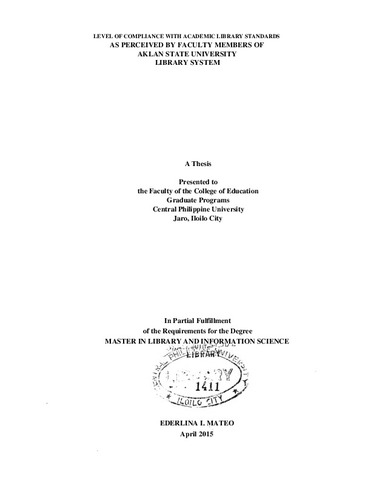Level of compliance with academic library standards as perceived by faculty members of Aklan State University Library System

Page views
522Date
2015Auteur
Thesis Adviser
Defense Panel Chair
Share
Metadata
Afficher la notice complète
Résumé
This study aimed to evaluate the level of compliance with academic library standards as perceived by faculty members of the Aklan State University Library System.
The respondents of the study were the 162 out of 272 faculty from five campuses of Aklan State University and were chosen using stratified random sampling.
This is a descriptive-correlation research that utilized the one-shot survey design.
The AACCUP Questionnaire on the library was utilized as basis for data gathering instrument. Analysis thereafter was done using frequency distribution, Cramers’ V and Gamma Test.
Female faculty respondents outnumbered the male respondents with a ratio of 3:1. The faculty members were mostly middle aged, married, and master’s degree holders. Some were involved in library committee in their respective campuses.
The level of compliance of the library with academic standards was generally perceived by the entire faculty to be adequate, mostly by females, by those between 31 to above 60 years old, and by those faculty regardless of civil status, academic rank, highest educational attainment and involvement in library committee.
Respondents’ civil status, area of specialization, and involvement in library committee were the factors which determined their perceived level of compliance of ASU library with academic library standards in terms of administration.
Area of specialization, length of work experience, academic rank, and involvement in library committee affects the respondents’ perceived level of compliance of ASU library with academic library standards in terms of staff/personnel.
Respondents’ perceived level of compliance of ASU library with academic library standard in terms of collection development, organization, and preservation was dependent on their area of specialization and involvement in library committee.
Further, faculty members’ perception on the compliance of ASU library with academic library standards in terms of services and utilization varies according to their length of work experience, academic rank, and highest educational attainment.
Moreover, respondents’ perceived level of compliance of ASU library with academic library standards in terms of physical set-up and facilities was dependent on their area of specialization, academic rank, and highest educational attainment.
Respondents' personal profiles were not contributory factors to their perceived level of compliance of ASU library with academic library standards in terms of financial support.
Area of specialization has a significant bearing on respondents 'perceived level of compliance of ASU library with academic library standards in terms of linkages.
The overall respondents' perception of the compliance of ASU library with academic library standards varies according to their area of specialization and academic rank.
The study concludes that the perceptions of the respondents on the level of compliance of the ASU library with academic library standards were found to be similar. They perceived academic library standards as adequately complied by ASU library.
Description
Abstract only
Suggested Citation
Mateo, E. I. (2015). Level of compliance with academic library standards as perceived by faculty members of Aklan State University Library System (Unpublished Master's thesis). Central Philippine University, Jaro, Iloilo City.
Type
ThesisSujet
Department
School of Graduate StudiesDegree
Master of Library and Information ScienceShelf Location
GSL Theses 020.72 M417
Physical Description
xiv, 129 leaves


